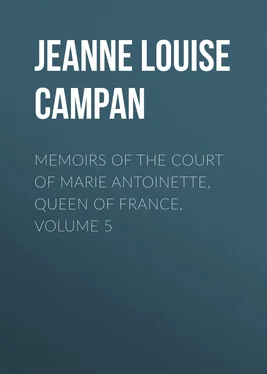Jeanne Louise Henriette Campan - Memoirs of the Court of Marie Antoinette, Queen of France, Volume 5
Здесь есть возможность читать онлайн «Jeanne Louise Henriette Campan - Memoirs of the Court of Marie Antoinette, Queen of France, Volume 5» — ознакомительный отрывок электронной книги совершенно бесплатно, а после прочтения отрывка купить полную версию. В некоторых случаях можно слушать аудио, скачать через торрент в формате fb2 и присутствует краткое содержание. Жанр: Биографии и Мемуары, История, foreign_edu, foreign_antique, foreign_prose, на английском языке. Описание произведения, (предисловие) а так же отзывы посетителей доступны на портале библиотеки ЛибКат.
- Название:Memoirs of the Court of Marie Antoinette, Queen of France, Volume 5
- Автор:
- Жанр:
- Год:неизвестен
- ISBN:нет данных
- Рейтинг книги:3 / 5. Голосов: 1
-
Избранное:Добавить в избранное
- Отзывы:
-
Ваша оценка:
- 60
- 1
- 2
- 3
- 4
- 5
Memoirs of the Court of Marie Antoinette, Queen of France, Volume 5: краткое содержание, описание и аннотация
Предлагаем к чтению аннотацию, описание, краткое содержание или предисловие (зависит от того, что написал сам автор книги «Memoirs of the Court of Marie Antoinette, Queen of France, Volume 5»). Если вы не нашли необходимую информацию о книге — напишите в комментариях, мы постараемся отыскать её.
Memoirs of the Court of Marie Antoinette, Queen of France, Volume 5 — читать онлайн ознакомительный отрывок
Ниже представлен текст книги, разбитый по страницам. Система сохранения места последней прочитанной страницы, позволяет с удобством читать онлайн бесплатно книгу «Memoirs of the Court of Marie Antoinette, Queen of France, Volume 5», без необходимости каждый раз заново искать на чём Вы остановились. Поставьте закладку, и сможете в любой момент перейти на страницу, на которой закончили чтение.
Интервал:
Закладка:
"Cubieres, the French loved Henri IV., and what king ever better deserved to be beloved?"
[Louis XVI. cherished the memory of Henri IV.: at that moment he thought of his deplorable end; but he long before regarded him as a model. Soulavie says on the subject: "A tablet with the inscription 'Resurrexit' placed upon the pedestal of Henri IV.'s statue on the accession of Louis XVI. flattered him exceedingly. 'What a fine compliment,' said he, 'if it were true! Tacitus himself never wrote anything so concise or so happy.' Louis XVI. wished to take the reign of that Prince for a model. In the following year the party that raised a commotion among the people on account of the dearness of corn removed the tablet inscribed Resurrexit from the statue of Henri IV., and placed it under that of Louis XV., whose memory was then detested, as he was believed to have traded on the scarcity of food. Louis XVI., who was informed of it, withdrew into his private apartments, where he was found in a fever shedding tears; and during the whole of that day he could not be prevailed upon either to dine, walk out, or sup. From this circumstance we may judge what he endured at the commencement of the Revolution, when he was accused of not loving the French people."—NOTE BY THE EDITOR.]
His return to Versailles filled his family with inexpressible joy; in the arms of the Queen, his sister, and his children, he congratulated himself that no accident had happened; and he repeated several times, "Happily no blood has been shed, and I swear that never shall a drop of French blood be shed by my order,"—a determination full of humanity, but too openly avowed in such factious times!
The King's last measure raised a hope in many that general tranquillity would soon enable the Assembly to resume its, labours, and promptly bring its session to a close. The Queen never flattered herself so far; M. Bailly's speech to the King had equally wounded her pride and hurt her feelings. "Henri IV. conquered his people, and here are the people conquering their King." The word "conquest" offended her; she never forgave M. Bailly for this fine academical phrase.
Five days after the King's visit to Paris, the departure of the troops, and the removal of the Princes and some of the nobility whose influence seemed to alarm the people, a horrible deed committed by hired assassins proved that the King had descended the steps of his throne without having effected a reconciliation with his people.
M. Foulon, adjoint to the administration while M. de Broglie was commanding the army assembled at Versailles, had concealed himself at Viry. He was there recognised, and the peasants seized him, and dragged him to the Hotel de Ville. The cry for death was heard; the electors, the members of committee, and M. de La Fayette, at that time the idol of Paris, in vain endeavoured to save the unfortunate man. After tormenting him in a manner which makes humanity shudder, his body was dragged about the streets, and to the Palais Royal, and his heart was carried by women in the midst of a bunch of white carnations! M. Berthier, M. Foulon's son-in-law, intendant of Paris, was seized at Compiegne, at the same time that his father-in-law was seized at Viry, and treated with still more relentless cruelty.
The Queen was always persuaded that this horrible deed was occasioned by some indiscretion; and she informed me that M. Foulon had drawn up two memorials for the direction of the King's conduct at the time of his being called to Court on the removal of M. Necker; and that these memorials contained two schemes of totally different nature for extricating the King from the dreadful situation in which he was placed. In the first of these projects M. Foulon expressed himself without reserve respecting the criminal views of the Duc d'Orleans; said that he ought to be put under arrest, and that no time should be lost in commencing a prosecution against him, while the criminal tribunals were still in existence; he likewise pointed out such deputies as should be apprehended, and advised the King not to separate himself from his army until order was restored.
His other plan was that the King should make himself master of the revolution before its complete explosion; he advised his Majesty to go to the Assembly, and there, in person, to demand the cahiers,
[Cahiers, the memorials or lists of complaints, grievances, and requirements of the electors drawn up by the primary assemblies and sent with the deputies.]
and to make the greatest sacrifices to satisfy the legitimate wishes of the people, and not to give the factious time to enlist them in aid of their criminal designs. Madame Adelaide had M. Foulon's two memorials read to her in the presence of four or five persons. One of them, Comte Louis de Narbonne, was very intimate with Madame de Stael, and that intimacy gave the Queen reason to believe that the opposite party had gained information of M. Foulon's schemes.
It is known that young Barnave, during an aberration of mind, since expiated by sincere repentance, and even by death, uttered these atrocious words: "Is then the blood now, flowing so pure?" when M. Berthier's son came to the Assembly to implore the eloquence of M. de Lally to entreat that body to save his father's life. I have since been informed that a son of M. Foulon, having returned to France after these first ebullitions of the Revolution, saw Barnave, and gave him one of those memorials in which M. Foulon advised Louis XVI. to prevent the revolutionary explosion by voluntarily granting all that the Assembly required before the 14th of July. "Read this memorial," said he; "I have brought it to increase your remorse: it is the only revenge I wish to inflict on you." Barnave burst into tears, and said to him all that the profoundest grief could dictate.
CHAPTER II
After the 14th of July, by a manoeuvre for which the most skilful factions of any age might have envied the Assembly, the whole population of France was armed and organised into a National Guard. A report was spread throughout France on the same day, and almost at the same hour, that four thousand brigands were marching towards such towns or villages as it was wished to induce to take arms. Never was any plan better laid; terror spread at the same moment all over the kingdom. In 1791 a peasant showed me a steep rock in the mountains of the Mont d'Or on which his wife concealed herself on the day when the four thousand brigands were to attack their village, and told me they had been obliged to make use of ropes to let her down from the height which fear alone had enabled her to climb.
Versailles was certainly the place where the national military uniform appeared most offensive. All the King's valets, even of the lowest class, were metamorphosed into lieutenants or captains; almost all the musicians of the chapel ventured one day to make their appearance at the King's mass in a military costume; and an Italian soprano adopted the uniform of a grenadier captain. The King was very much offended at this conduct, and forbade his servants to appear in his presence in so unsuitable a dress.
The departure of the Duchesse de Polignac naturally left the Abbe de Vermond exposed to all the dangers of favouritism. He was already talked of as an adviser dangerous to the nation. The Queen was alarmed at it, and recommended him to remove to Valenciennes, where Count Esterhazy was in command. He was obliged to leave that place in a few days and set off for Vienna, where he remained.
On the night of the 17th of July the Queen, being unable to sleep, made me watch by her until three in the morning. I was extremely surprised to hear her say that it would be a very long time before the Abbe de Vermond would make his appearance at Court again, even if the existing ferment should subside, because he would not readily be forgiven for his attachment to the Archbishop of Sens; and that she had lost in him a very devoted servant. Then she suddenly remarked to me, that although he was not much prejudiced against me I could not have much regard for him, because he could not bear my father-in-law to hold the place of secretary of the closet. She went on to say that I must have studied the Abbe's character, and, as I had sometimes drawn her portraits of living characters, in imitation of those which were fashionable in the time of Louis XIV., she desired me to sketch that of the Abbe, without any reserve. My astonishment was extreme; the Queen spoke of the man who, the day before, had been in the greatest intimacy with her with the utmost coolness, and as a person whom, perhaps, she might never see again! I remained petrified; the Queen persisted, and told me that he had been the enemy of my family for more than twelve years, without having been able to injure it in her opinion; so that I had no occasion to dread his return, however severely I might depict him. I promptly summarised my ideas about the favourite; but I only remember that the portrait was drawn with sincerity, except that everything which could denote antipathy was kept out of it. I shall make but one extract from it: I said that he had been born talkative and indiscreet, and had assumed a character of singularity and abruptness in order to conceal those two failings. The Queen interrupted me by saying, "Ah! how true that is!" I have since discovered that, notwithstanding the high favour which the Abbe de Vermond enjoyed, the Queen took precautions to guard herself against an ascendency the consequences of which she could not calculate.
Читать дальшеИнтервал:
Закладка:
Похожие книги на «Memoirs of the Court of Marie Antoinette, Queen of France, Volume 5»
Представляем Вашему вниманию похожие книги на «Memoirs of the Court of Marie Antoinette, Queen of France, Volume 5» списком для выбора. Мы отобрали схожую по названию и смыслу литературу в надежде предоставить читателям больше вариантов отыскать новые, интересные, ещё непрочитанные произведения.
Обсуждение, отзывы о книге «Memoirs of the Court of Marie Antoinette, Queen of France, Volume 5» и просто собственные мнения читателей. Оставьте ваши комментарии, напишите, что Вы думаете о произведении, его смысле или главных героях. Укажите что конкретно понравилось, а что нет, и почему Вы так считаете.












